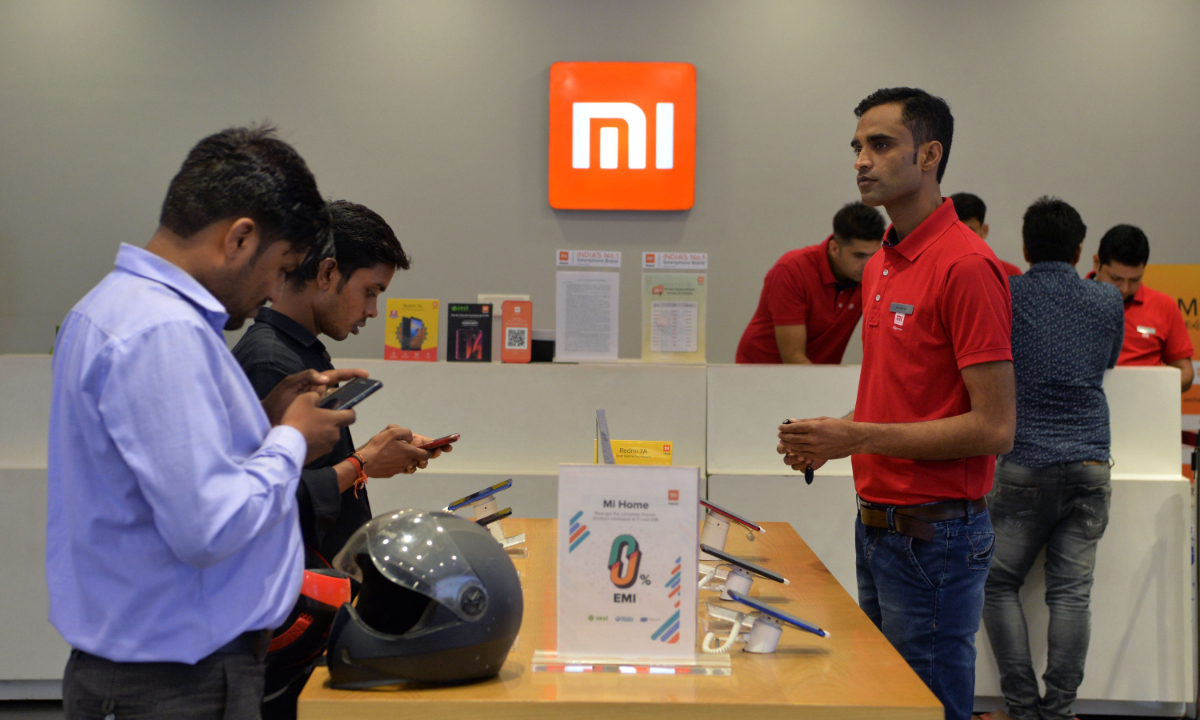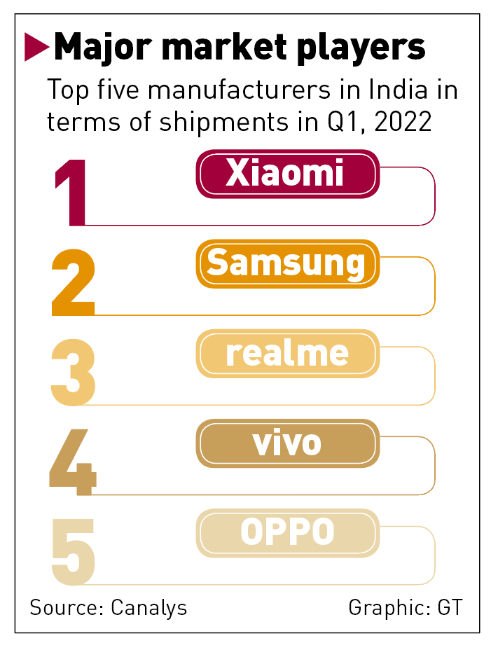Chinese mobile phone industry expects a ‘level-playing field’ in India while putting more weight on neighboring markets
Domestic players weigh in on Indian market business expansion

Photo: VCG
China's mobile phone industry players, an increasingly important participant in the global market, are hoping Indian government will improve market environment in the wake of the recent government probe over Chinese company Xiaomi in April, which industry insiders fear is a follow-up to the probes targeting Chinese companies last year.
Industry insiders are hoping for "decent" treatment from the country's government so that the confidence toward the Indian market will not be shattered as Chinese mobile phone companies have evidently ramped up the business investment and expansion in India, with the local purchasing rate in the South Asian country reaching 20 percent, which is expected to double by 2024, according to the latest data from the India China Mobile Phone Enterprise Association.
Industry insiders said that the trend not only strengthens India's supply chain and Prime Minister Modi's "Make in India" campaign but also serves as living evidence of the complementarities between Chinese companies in pursuing for globalization and lower labor costs in addition to tapping into the booming Indian market, despite progress being shadowed by the intermittent and targeted investigations by the Indian authorities direct toward Chinese firms.
The data from the association, an industry body that represents the Chinese mobile industry in India, shows that leading Chinese mobile phone companies including Xiaomi Corp have consolidated their supply chains in India, with their local purchases accounting for 20 percent of input, with this figure expected to reach 50 percent by 2024.
From the assembly foundries such as Foxconn and Wingtech Technology to display module producers like TCL China Star Optoelectronics Technology, as well as companies with camera modules, chargers, batteries, data cables and shell materials, Chinese-backed mobile phone players are pushing their partners to set up factories in India, according to the association.
At the same time, OPPO and vivo each purchased certain amount of land to build industrial parks in the neighboring country, with OPPO's industrial park already entering production, and the vivo industrial park expected to enter production next year, Yang Shucheng, the secretary-general of CMPEA, told the Global Times on Tuesday.
"The reason that Chinese-funded mobile phone companies choose to settle and expand business in India is because they are looking for a wider market while embracing globalization, and they also value the low labor and production costs," Yang said.
Harris Liu from the Chinese Chamber of Commerce in India told the Global Times on Tuesday that the Indian government encourages local production and procurement, and with the gradual increase in tariffs on imported components, the proportion of local procurement will increase year by year.

Customers experience Xiaomi products at a local Mi store in Gurgaon, India on August 20, 2019.
Strong complementarities
Several Chinese mobile phone related companies that the Global Times reached out to on Monday held a positive perspective toward the Indian market and all expressed their willingness to continue engaging in business development in the country.
Jiangxi-based Holitech, a supplier of a major Chinese-funded mobile phone company in India, told the Global Times on Tuesday that their business operations in India had been smooth and that they plan to continue with their local business.
Shenzhen TXD Technology, which produces LCD module and camera modules in India, told the Global Times that they have not been disrupted by the government probe over Xiaomi and expects to continue with their market expansion in India.
"Chinese-funded mobile phone brands are doing well in India, occupying about two thirds of the market, and it is an inevitable trend for Chinese-funded enterprises to help India build a complete industrial chain," Yang said.
While the impact of the COVID-19 pandemic, global high inflation crises and other factors have placed pressure on global supply chains, with global smartphone production volume in the first quarter of 2022 witnessing a quarter-on-quarter decrease of 12.8 percent, according to the latest data from TrendForce, India's shipment was still among the world's top three, accounting for 13.1 percent together with China and the US, which took 21.1 percent and 11 percent, respectively.
The top five manufacturers in India in terms of shipments are Xiaomi, Samsung, realme, vivo and OPPO, with the shipments of Chinese mobile phone manufacturers in the country exceeding 50 percent of total output, according to a report released by market research firm Canalys analyzing smartphone shipments in the Indian market in the first quarter of 2022.
At the same time, although, due to a variety of reasons, Chinese companies have rarely benefited from India's Production Linked Incentive Scheme, which seeks to make India a significant manufacturing destination and plug into the global supply chain, the situation is reportedly changing amid the increasingly frequent economic and trade exchanges between China and India.
An industry insider told the Global Times on condition of anonymity that recently, there have been rumors in India that the review of some Chinese investments may be relaxed, and India has begun to reopen the door for Chinese-funded enterprises to participate in the production of domestically produced goods in India.

Fair treatment expected
While there are general expectations that Indian regulators may relax its tough stance and probing activities targeting Chinese companies, the recent investigation targeting Xiaomi has once again put industry insiders on alert.
India's tax investigations into Xiaomi might be part of its routine tax inspection work, but it should be emphasized that its inspection process was relatively "rough," which may affect Chinese companies' confidence in investing in the Indian market, Yang said.
In the face of damage to legitimate rights and interests, enterprises must have the courage to defend themselves through legal channels, Liu noted.
Industry insiders fear that the recent probe could be a follow-up of Indian government's move targeting Chinese companies.
On April 17, 2020, on the reported grounds of preventing assets from being acquired by foreign investors during the epidemic, India's Ministry of Commerce and Industry suddenly revised FDI regulations, a policy change that has largely discouraged foreign investors including Chinese companies from investing in India.
Since the start of this policy, the number of Chinese-funded mobile phone-related companies that have passed the approval of Indian authorities has been less than 10 percent of the typical levels, industry insiders said.


